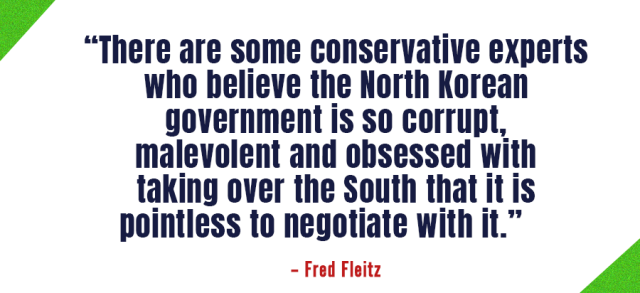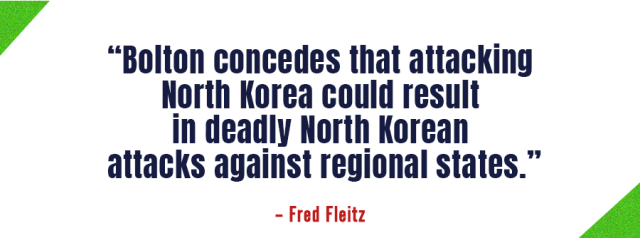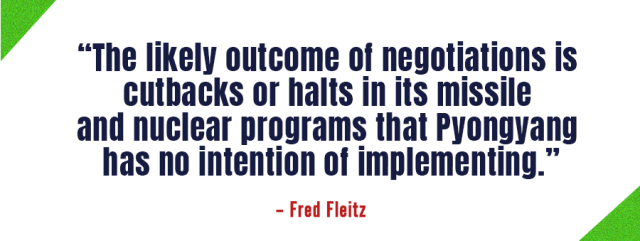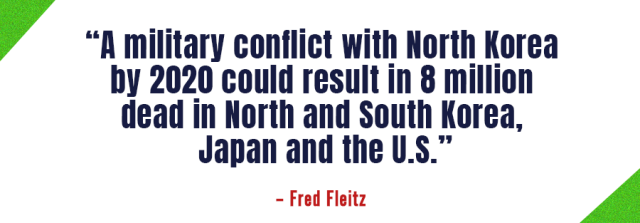
WASHINGTON — In a book published just three months ago, Fred Fleitz, the recently appointed chief of staff of the White House National Security Council advocated the “limited use of military force” against North Korea, whose leader President Trump will meet in Singapore next week.
Fleitz also described the president’s top national security adviser, John Bolton, a former U.S. ambassador to the United Nations, as believing the U.S. must “soon” use force against North Korea. It’s a stark contrast from the president’s optimism about the possible outcome of the summit with Kim Jong Un:
“There are some conservative experts who believe the North Korean government is so corrupt, malevolent and obsessed with taking over the South that it is pointless to negotiate with it. These experts include Ambassador John Bolton, who believes regime change is the only solution to the North Korean threat and that it is vital that the U.S. use force soon to end this regime before the costs of doing so and the risks to the U.S. homeland become unacceptable,” Fleitz wrote.
Fleitz offered these views in his book “The Coming North Korea Nuclear Nightmare,” published on March 8, exactly one day before the White House announced that Trump would hold talks with Kim, the first meeting between a sitting U.S. president and a North Korean leader.
Kim’s family has led a brutal regime in the country since it was founded after World War II. America and North Korea do not have diplomatic relations and have technically been in a state of war since the outbreak of the Korean War, which ended in 1953 with an armistice rather than a formal peace treaty. Tensions between the two nations have increased in recent years as North Korea made advances in its nuclear weapons program and threatened to attack the U.S.

The comments in Fleitz’s book are particularly noteworthy given both his position in the administration and his long association with Bolton. Fleitz, who has been described as a Bolton loyalist, was named as the NSC chief of staff and executive secretary late last month. When Bolton was an undersecretary of state under President George W. Bush, Fleitz was his chief of staff. Fleitz has also served as a CIA analyst, made frequent appearances on Fox News, and worked as a senior vice president at the Center for Security Policy, a conservative think tank notable for its strident warnings about Islamic expansionism. The Center for Security Policy published Fleitz’s book on North Korea.
In his description of Bolton’s position, Fleitz wrote that the national security adviser knows an American strike against North Korea could lead Kim to launch attacks on other countries in the region, including American allies South Korea and Japan, and, even potentially on the United States itself. Still, Fleitz said both Bolton and Trump think it’s worth the risk.
“Bolton concedes that attacking North Korea could result in deadly North Korean attacks against regional states, but he believes such attacks are inevitable if the world allows North Korea to complete its nuclear weapons and missile programs. President Trump has made statements suggesting that he also may hold this view,” Fleitz wrote.
Yahoo News contacted the White House to ask if the characterizations of Bolton’s positions in Fleitz’s book were accurate and whether the views he described reflect administration policy. National Security Council spokesperson Garrett Marquis responded by simply saying Bolton and Trump are united in their approach.
“President Trump’s policy is Mr. Bolton’s policy. There is no daylight between them,” said Marquis.
Bolton, who has a well-established reputation as a foreign policy hawk, became Trump’s top national security adviser in April, the third person to hold that position since Trump took office in January 2017.
Bolton was considered a hard-liner on North Korea and skeptical about the summit, which was briefly canceled before being reinstated. He was reportedly not going to attend the meeting, but top White House adviser Kellyanne Conway said Wednesday that he will be there. The White House did not respond to questions from Yahoo News about whether Fleitz will also be at the meeting with Trump and Kim.

While different officials and ideas rapidly fall in and out of favor in the White House, Fleitz’s book sheds light on what exactly Bolton and his allies could be pushing for on one of the most crucial foreign policy issues facing the Trump administration.
Fleitz also discussed one of the more controversial North Korea strategies that has been considered by the Trump administration — a so-called bloody nose strike. In February, there were multiple reports White House officials were clashing over whether or not to launch a limited strike against North Korea that would get the country to reconsider its nuclear weapons program. White House officials subsequently denied considering the idea. However, Fleitz said sources told him the plan was considered and remains on the table.
“Although the bloody nose strategy was supported by many conservatives, Trump officials began to deny its existence in mid-February 2018, probably in response to the negative publicity it received and concerns raised by South Korean officials. … The author is skeptical about those denials,” Fleitz wrote, adding, “This strategy is consistent with what President Trump told a senior foreign policy expert (relayed by this expert to the author) during a December 2017 meeting: that [former National Security Adviser General H.R. McMaster] and [Secretary of Defense James Mattis] favored some kind of limited attack on North Korea. … Although some Trump officials … always opposed the bloody nose strategy, the author believes this was and continues to be a Trump administration policy option for dealing with North Korea.”
Fleitz shared his own views on North Korea in the book. He makes a lengthy indictment of President Obama’s North Korea policy, which he dismisses as “dithering” and “disinterest[ed].” The previous administration’s policies “significantly worsened the threat from the rogue state by giving it eight years to develop advanced missiles and nuclear weapons with almost no opposition from the U.S. and the international community,” he writes.

Fleitz also criticized South Korean President Moon Jae-in as “a liberal politician who favors a more conciliatory approach to North Korea.” The U.S. faces “difficulties” when “relying on South Korean President Moon,” he wrote.
The president was dealt a “bad hand” by Obama, Fleitz wrote, and praised Trump for making “the best of a difficult situation.” He argues that Trump’s campaign of “maximum pressure” that included stiff economic sanctions and threats of “fire and fury” was successful, encouraging North Korea to come to the negotiating table.
Fleitz suggested that, when it comes to North Korea, there are two major “sobering questions” facing Trump.
“Are there ways to use military force to contain or roll back North Korea’s nuclear and missile programs without sparking a war? What is the actual purpose of North Korea’s nuclear and missile efforts? Deterrence? Blackmail to extort concessions? Or as a means to one day force the reunification of the Korean Peninsula on Pyongyang’s terms?” asked Fleitz.
Fleitz was unambiguous in his answer to the latter question.
“My view is that North Korea’s missile and nuclear programs are offensive in nature, not a deterrent and not simply blackmail tools,” Fleitz wrote.
Rather than a tool to extract foreign aid, Fleitz said he viewed the weapons as an arsenal North Korea “will one day use to force the reunification of the Korean Peninsula on its terms and expel American forces from the region.”
On the question of whether America can use force to deter North Korea’s nuclear program without sparking a catastrophic conflict, Fleitz offered a more nuanced answer. In the end, he recommended what he described as “limited” military action.
According to Fleitz, “before the U.S. considers military action, every option short of war must be fully explored and exhausted.” But, somewhat contradictorily, he repeatedly dismissed the idea negotiations would yield meaningful results.

“The Kim family’s 70-year legacy of tyranny, belligerence, corruption and criminality, coupled with its iron grip on power controlling North Korea makes negotiating a meaningful nuclear agreement with the Kim regime difficult, if not impossible,” wrote Fleitz.
The likely outcome of negotiations, he wrote, is “cutbacks or halts in its missile and nuclear programs that Pyongyang has no intention of implementing.” For Fleitz, anything short of full denuclearization of the Korean Peninsula “amounts to appeasement.” He described overtures North Korea made during the Winter Olympics, which were held in South Korea earlier this year, as “a propaganda ploy and a charade.”
“If diplomacy and sanctions fail … my recommendation is that President Trump consider carefully calibrated, limited use of military force to change the dynamics of the North Korea situation and compel it to negotiate the denuclearization of the Korean Peninsula,” Fleitz wrote. “This limited use of force could include declaring a missile no-fly zone over North Korea, shooting down any missiles Pyongyang tests, a naval blockade and stopping and searching North Korea ships for WMD-related cargo.”
While he said Bolton hopes to see “regime change” in North Korea, Fleitz did not directly state his own view on that possibility. But he noted “many experts believe the only real solution to the threat from North Korea’s nuclear program is regime change.” Fleitz also discussed “the idea of letting China take out the Kim regime or invade North Korea.” He described the prospect of war as a “horrifying thought given the massive loss of life that would occur if North Korea was to attack South Korea, especially Seoul, with its huge artillery arsenal, missiles, chemical and biological weapons as well as nuclear weapons.”
“A major outbreak in hostilities could also include North Korea attacking U.S. bases in the region and Japan,” Fleitz added.
If anything, Fleitz is more pessimistic about North Korea’s ability to retaliate than other experts. Due to the reclusive nature of the Kim regime, it’s difficult to verify the extent of North Korea’s weapons program. However, Fleitz seems to take the view that the country will be imminently capable of striking the U.S. with a nuclear weapon. He cited one estimate that “a military conflict with North Korea by 2020 could result in 8 million dead in North and South Korea, Japan and the U.S., due to North Korean nuclear strikes against Los Angeles, San Francisco, Seattle, and Portland.”
Fleitz’s recommendation of “limited” military action is based on a belief that it “hopefully” would not spark a counterattack against the U.S. or even South Korea. He predicted carefully calibrated measures would “change the policy assumptions of North Korea’s leadership by demonstrating that America now has a decisive president who will use — and will escalate — military force to protect the security of the United States and its allies.” Fleitz acknowledged that “the U.S. cannot be sure whether limited military action would result in North Korean retaliation and escalation.” Still, Fleitz argued that “limited military action is a risk worth taking” to avoid a future war with a nuclear North Korea.

Victor Cha is a policy expert on North Korea who was Trump’s original pick to be ambassador to South Korea. The White House did not submit his nomination after he expressed opposition to a potential bloody nose strike. In a phone conversation with Yahoo News, Cha said he believes Fleitz’s description of Bolton’s views is accurate and said he was “not surprised” to hear it, given some of the national security adviser’s past statements. Cha noted the more hawkish approach to North Korea “was sort of where we were in 2017,” before Kim’s Olympic overtures and the plans for talks with Trump.
“I think if this summit fails spectacularly we could end up going back to those sorts of things,” Cha said.
While Cha doubted that Bolton supported the summit, he said the national security adviser was unlikely to oppose Trump’s wishes.
“Bolton is a smart man,” Cha said, adding, “He knows that if the president wants to do a meeting he’s not going to get in the way.”
In the meantime, Cha predicted Bolton’s “influence will be felt” mainly through the national security adviser resisting attempts to “lift the sanctions too early.”
And if the meetings with Kim don’t reach a successful conclusion does Cha see Bolton and his team pushing for a military solution in North Korea?
“I don’t know. I mean I just don’t know,” Cha said. “It’s impossible to say.”

No comments:
Post a Comment